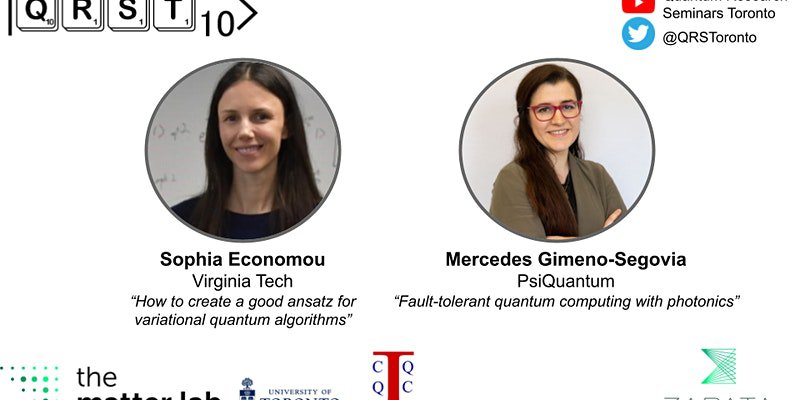
Quantum Research Seminars Toronto consist of two 30 min talks about some Quantum Computation topic. Seminars are given by high-level quantum computing researchers with the focus on disseminating their research among other researchers from this field. We encourage to attend researchers regardless of their experience as well as graduate and undergraduate students with particular interest in this field. Basic notions on quantum computing are assumed, but no expertise in any particular subject of this field.
In this 10th series of seminars, the speakers will be Sophia Economou (Virginia Tech) and Mercedes Gimeno-Segovia (PsiQuantum). Their talks are titled "How to create a good ansatz for variational quantum algorithms" and "Fault-tolerant quantum computing with photonics", respectively.
We will send a Zoom link to those who register for this event 2 days, 2 hours and 10 min before the event starts.
The event recording, slides and chat history will be published in our Youtube channel and sent to the registered participants.
Looking forward to seeing you all!
___________________________________________________________________
Talk 1:
How to create a good ansatz for variational quantum algorithms
Variational quantum algorithms (VQAs) constitute a class of hybrid quantum-classical algorithms that are investigated primarily for NISQ processors. A crucial element of VQAs is the choice of ansatz. I will give highlights from our work on the preparation of compact, problem-tailored ansatze for quantum many-body simulation and optimization.
About the speaker:
Sophia Economou is a Professor of Physics and the Hassinger Senior Fellow of Physics at Virginia Tech. She focuses on theoretical research in quantum information science, including quantum computing, quantum communications, and quantum simulation algorithms.
Talk 2:
Fault-tolerant quantum computing with photonics
General purpose quantum computers will utilize millions of physical qubits, thus requiring an underlying qubit technology that can be manufactured at scale. Integrated silicon photonics is an intrinsically scalable and manufacturable platform where all necessary gates are available to manipulate qubits, encoded in photons, with very high fidelity and low noise. In this talk, we will discuss architectures for fault-tolerant quantum computing with photonics in the newly-introduced fusion-based quantum computing paradigm. Fusion-based quantum computing presents a new framework for fault-tolerant quantum computation, focused on the efficient integration of quantum error correction and physical-level hardware operations. Its primitives, small entangled resource states and projective entangling gates, make it particularly useful in an integrated photonics platform, offering significant architectural simplifications and reducing requirements on physical level operations.
About the speaker:
Mercedes Gimeno-Segovia is Sr. Director of Quantum Architecture at PsiQuantum Corp. She received her PhD from Imperial College London for her work on linear optical quantum computing architectures. After postdoctoral positions in Bristol (UK) and Calgary (Canada), she joined PsiQuantum in 2017, where she leads a team working on the design and development of an architecture for universal fault-tolerant quantum computing using silicon photonics.

